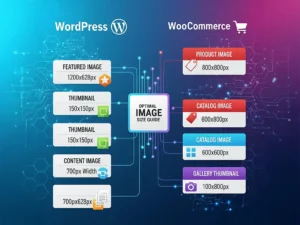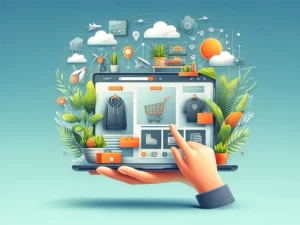In the previous article we defined what is e-commerce and left out a few topics that are equally important in defining this business model of the digital age.
This article will look at the e-commerce technologies used, the socio-economic impact and some legislation and regulations.
Finally, we’ll look at some examples of success from various e-commerce giants, realising that this is a very relative and somewhat personal choice, and that many more are left unmentioned.
E-commerce technologies used.
If marketing strategies are essential, e-business can’t live without technology. Let’s just talk about a few e-commerce technologies that we can then individually detailee in future articles.
E-commerce platforms
E-commerce platforms provide the tools needed to create, manage, and operate an online shop. There are several options available, from hosted platforms like Shopify and BigCommerce to open-source solutions like WooCommerce, Prestashop and Magento. These platforms offer a variety of features, including inventory management, payment processing, design customisation and integration with other systems.
Payment systems

Online payment systems are essential for facilitating financial transactions between merchants and customers. There are several options available, from payment gateways such as PayPal, Stripe and Square to payment solutions integrated into e-commerce platforms. These systems allow merchants to accept a variety of payment methods, including credit cards, debit cards such as MB, bank transfers and digital wallets.
Online security
Online security is a key concern for e-commerce businesses, as it involves processing sensitive customer information such as payment data and personal information. Companies use a variety of security measures, including SSL certificates, two-factor authentication, data encryption and suspicious activity monitoring. In addition, companies must comply with data security regulations, such as PCI DSS, to ensure the protection of customer data.
Data analysis
Data analysis tools allow merchants to collect, analyse and interpret data on customer behaviour, purchasing trends and website performance. These tools provide valuable information that can be used to optimise the customer experience, improve the effectiveness of marketing campaigns, and make informed decisions about business strategies. Examples include Google Analytics, Hotjar and Kissmetrics.
Third-party integrations
In addition to the technologies mentioned above, many electronic commerce businesses also use a variety of third-party integrations to extend the functionalities of their platforms. These integrations can include CRM and ERP systems, marketing automation, inventory management and EAN codes, transport, and logistics, among others. Integrating these tools allows merchants to customise and optimise their e-commerce operation to meet their specific needs.
These are some of the main technologies used in e-business to create a secure, efficient, and personalised online shopping experience for customers. Investing in the right technology can improve operational efficiency, increase sales, and offer your customers a superior shopping experience.
Socio-economic impact
Electronic commerce has a significant impact on society and the global economy:
Global Market Access
One of the main advantages of e-commerce is global market access. Companies can reach consumers all over the world without the geographical restrictions of physical shops. This global access creates opportunities for small and medium-sized companies to expand their business into international markets and compete on equal terms with large multinational companies. In addition, consumers have access to a wider variety of products and services, regardless of their geographical location.
Job creation
Electronic commerce has a significant impact on job creation, both directly and indirectly. E-commerce companies employ various types of professionals, including web programmers, graphic designers, digital marketing specialists, data analysts, product managers and customer service. In addition, the growth of e-business also drives demand for fulfilment, logistics, transport and packaging services, creating additional employment opportunities throughout the supply chain.
Economic inclusion
By offering business opportunities to groups that traditionally face barriers to market access, such as women, people with disabilities and residents of rural areas, e-commerce has the potential to promote economic inclusion. Its decentralised nature allows entrepreneurs everywhere to start and operate online businesses with relatively low start-up costs, helping to reduce economic disparities and promoting equal opportunities.

Changing Consumption Patterns
Consumption patterns are changing, influencing the way people buy and consume products and services. Consumers now have access to a greater variety of purchasing options, can compare prices easily and shop anytime and anywhere. This has led to a shift in consumer preferences towards convenience, personalisation, and improved shopping experiences.
Environmental Impact

While electronic commerce offers many socio-economic benefits, it also has a significant environmental impact. The increased transport of goods results in greater greenhouse gas emissions, road congestion and air pollution. In addition, the production of packaging and the creation of waste also contribute to environmental problems.
E-commerce companies are increasingly aware of these issues and are adopting measures to reduce their environmental impact, such as implementing sustainable packaging and greener delivery options, forcing hauliers to change the type of fuel used in their delivery vehicles and more.
In short, electronic commerce has a significant impact on the socio-economic aspects of society, offering business opportunities, promoting economic inclusion, and influencing consumption patterns. However, it also presents challenges, such as environmental issues and economic inequalities, which need to be addressed to ensure the sustainable development of e-commerce.
Legality and regulation
Consumer protection
E-commerce legislation generally includes provisions to protect consumer rights. This can cover areas such as return and refund rights, product guarantees, clear pricing information and privacy policies. In Portugal, consumer legislation is governed by the Consumer Rights Act and European Union legislation, which establish rights and obligations for both consumers and online traders.
Data Security

The protection of personal data is a growing concern in the electronic commerce environment. Data protection regulations, such as the General Data Protection Regulation (GDPR) in the European Union, establish requirements for the collection, storage, and processing of customers’ personal data. E-commerce companies must ensure adequate cyber security measures and transparent privacy policies to protect consumer information from unauthorised access and misuse.
Taxation and Tax Regulations
Taxation in e-commerce can be complex due to the cross-border nature of online transactions. E-business companies may be subject to different tax regimes depending on the location of the customer and the seller, as well as the type of product or service sold. Governments are increasingly implementing specific tax regulations for e-commerce, including online sales taxes, import duties and regulations on cross-border transactions.
Intellectual property rights
The protection of intellectual property rights is another important area of e-commerce legislation. This includes copyright, trademarks, patents, and design rights. E-commerce companies must ensure that they respect the intellectual property rights of third parties when selling products or services online. In addition, online traders must protect their own intellectual property rights from infringement by third parties.
Regulating cross-border e-commerce
Cross-border e-commerce presents unique regulatory challenges due to differences in laws and regulations between countries. Companies operating in several countries must be aware of local regulations relating to issues such as taxes, consumer protection, intellectual property, and data protection. Harmonising electronic commerce regulations between countries can facilitate cross-border trade and promote global economic integration.
Electronic Accessibility Law and WCAG V2.1 AA
The Electronic Accessibility Act represents a significant milestone in promoting digital inclusion in Portugal and the European Union. This set of laws aims to ensure that all citizens, regardless of their abilities or limitations, can access digital content and services in an equitable manner.
In Portugal, the implementation of digital accessibility gained new urgency with the entry into force of Decree-Law 82/2022 in October 2022, which establishes specific deadlines for the accessibility compliance of digital services and products. This decree-law complements existing legislation and reinforces the commitments made in the field of digital accessibility and will be in force for all entities from 28 June 2025.
Examples of success
Amazon
Amazon is one of the biggest players in global e-business. Founded by Jeff Bezos in 1994, the company began as an online bookshop and has expanded to offer a wide variety of products, including electronics, clothing, food, and video streaming services. Amazon is known for its emphasis on convenience, vast product selection and personalised shopping experience.
Alibaba
Alibaba is a China-based electronic commerce platform founded by Jack Ma in 1999. The company operates several e-commerce sites, including Taobao (a C2C marketplace), Tmall (a B2C marketplace) and AliExpress (a global marketplace). Alibaba is known for connecting Chinese manufacturers and suppliers to buyers around the world and for facilitating international transactions.
Worten
Worten is one of the leading e-commerce companies in Portugal, specialising in the sale of electronic products and household appliances. Founded in 1996, Worten has a strong presence both online and offline, with physical shops across the country and a robust e-commerce platform. The company stands out for its wide selection of products, competitive prices and excellent customer service.
FNAC
FNAC is a chain of retail shops specialising in culture, electronics, and entertainment. Founded in France in 1954, FNAC has expanded to several European countries, including Portugal. FNAC Portugal has a significant presence in the e-commerce market, offering a wide range of products, from books and music to technology and cultural products. The company is known for its diverse offer, cultural events, and unique shopping experience.
Farfetch
Farfetch is a global luxury fashion e-commerce platform founded in 2007 by José Neves. The company connects consumers to more than 1,300 boutiques and fashion brands around the world, offering an exclusive selection of high fashion products. Farfetch stands out for its focus on technological innovation, personalised shopping experience and partnerships with renowned designers and brands.
Farfetch became Portugal’s first unicorn, valued at over 1 billion dollars. Unfortunately, in December 2023 the news indicated that the company was facing difficulties, and it was eventually acquired in January 2024 by the South Korean e-commerce company Coupang. The fact that it was taken over does not detract from the fact that it is an example of success.
eBay
eBay is one of the first e-commerce and online auction platforms, founded in 1995 by Pierre Omidyar. With a wide range of products available to buy and sell, eBay has become a popular destination for buyers and sellers all over the world. The platform allows transactions between individuals and companies, offering a variety of products, from collectibles and electronics to household products and clothing.
Zalando
Zalando is a fashion e-commerce company based in Germany, founded in 2008 by Robert Gentz and David Schneider. Specialising in fashion and footwear, Zalando offers a wide selection of brands and styles for men, women, and children. The company stands out for its personalised shopping experience, fast delivery, and free returns policy, making it a popular choice among European consumers.
Booking.com
Although it is best known as an accommodation booking service, Booking.com is also an example of e-commerce success. Founded in 1996 by Geert-Jan Bruinsma, Booking.com has become one of the largest accommodation booking platforms in the world. It offers a diverse selection of accommodation, from hotels and flats to holiday homes and unique lodgings, all over the world. The platform is valued for its competitive prices, wide selection of accommodation options and easy-to-use booking system.
These are just a few examples of successful e-commerce companies, demonstrating the diversity and scope of this ever-growing sector. They illustrate the potential of e-commerce to transform industries and create business opportunities around the world.
The future of e-commerce
The future of e-commerce promises to be exciting and full of innovation, driven by the evolution of technology and changing consumer preferences. Here are some trends and predictions for the future of e-commerce:
Personalisation and Customer Experience
As data analysis and artificial intelligence technology continues to advance, e-commerce companies are expected to focus even more on personalising the customer experience. This includes personalised product recommendations, exclusive offers based on purchase history and more personalised interactions at all points of contact with the customer. Personalisation will be essential for winning and keeping customer loyalty in an increasingly competitive market.
Omnichannel commerce
Omnichannel commerce, which seamlessly integrates online and offline shopping experiences, will be increasingly common in the future of e-commerce. Consumers expect to be able to shop and interact with brands consistently across all channels, whether online, in physical shops, via mobile devices or on social networks. Companies that manage to offer a cohesive omnichannel experience will have a significant competitive advantage.
Greater integration between the online and offline worlds is expected, and this includes the expansion of physical shops to offer omnichannel services such as click-and-collect, in-store returns and improved shopping experiences.
At the same time, more traditional companies are expected to adopt e-commerce strategies to reach new customers and remain relevant in an ever-changing market.
Integration of Augmented and Virtual Reality

Augmented reality (AR) and virtual reality (VR) have the potential to completely transform the online shopping experience, allowing consumers to visualise products in their homes before making a purchase. This is especially relevant for products such as furniture, clothing and decorative items, where visualising the product in the home environment is important. As AR and VR technology becomes more accessible, more companies are expected to incorporate these technologies into their e-commerce platforms.
Sustainability and Social Responsibility
Consumers are increasingly aware of the environmental and social impact of their purchases, and this is shaping the future of e-commerce. Companies are expected to adopt more sustainable practices in their operations, from packaging and shipping to more ethical supply chains. In addition, consumers increasingly value brands that demonstrate commitments to social and environmental causes, and e-commerce companies that incorporate these values into their brand identity will have a competitive advantage.
These are just some of the trends and predictions for the future of e-commerce, and it’s amazing to imagine how the industry will continue to evolve in the coming years. To find out more about the history of e-commerce and how we got to today, I recommend reading the article “History of E-commerce: The Evolution of E-commerce“.
Conclusion
As e-commerce continues to play a key role in the global economy, it’s clear that the underlying technologies play a crucial role in its success. From e-commerce platforms to payment systems and data analytics, technological infrastructure is essential to creating a secure, efficient, and personalised online shopping experience for consumers.
The socio-economic impact of e-commerce is equally significant, providing global market access, generating jobs, promoting economic inclusion, and influencing consumption patterns. However, it also presents challenges, such as environmental issues and economic inequalities, which need to be addressed to ensure the sustainable development of e-commerce.
In addition, legislation and regulation play a key role in protecting consumer rights, data security, taxation and fiscal regulation, intellectual property rights and cross-border e-commerce. Compliance with regulations is essential to guarantee consumer confidence and market integrity.
Finally, the examples of success in e-commerce highlight the diversity and scope of this ever-growing sector. With a customer-centred approach, a focus on technological innovation and a commitment to sustainability, the future of e-commerce promises to be exciting and full of opportunities.
Do I need technical skills to run an e-commerce business?
Although technical skills can be useful, they are not always necessary to run an e-commerce business. Many platforms offer user-friendly interfaces and tools that make it easier for non-technical users to manage online shops. However, having basic computer knowledge and the ability to learn new software can be useful.
What is the socio-economic impact of e-commerce?
E-commerce has a significant impact on society and the global economy, such as global market access, job creation, economic inclusion and changing consumption behaviour patterns.







